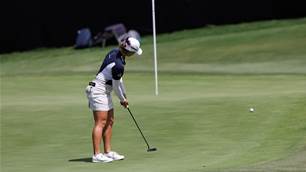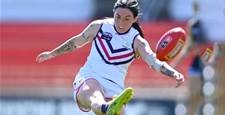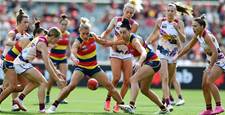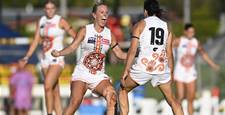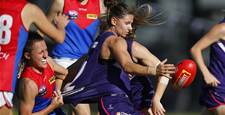While 2015 was a banner year for female footballers, it was also another big year for Australia's female referees.
While 2015 was a banner year for female footballers, it was also another big year for Australia's female referees.
When it comes to football in Asia, there are few who are as experienced, well credentialed and respected as Assistant Referee Allyson Flynn.
The 2013 AFC Assistant Referee of the Year, Flynn missed out on running the lines at London 2012 due to injury. That absence from London has made Flynn's selection to officiate in Rio this year just a little bit sweeter.
In between work and preparations, she sat down with The Women's Game.
Allyson, congratulations on your selection for Rio 2016. What has the response to selection for Rio been? How you feeling?
I’m feeling really good about it. I feel like I’ve been given another opportunity. To have missed out on London, and have another chance to go to Rio is something that I’m very grateful for. I’m feeling a bit relieved, and just really looking forward to getting there.
I’ve sat down with the FFA and the head of refereeing and we’ve worked out a bit of a plan of what I need to do between now and Rio to make sure I get on the plane.
You've come a long way in the game and now are about to add the Olympics to your resume. How did your refereeing journey start?
I was playing for my club and I would spend most of my days out at the soccer club. I worked out that I could earn a bit of money if I refereed. So, then I played and refereed. I was earning some money while spending all my days at soccer fields. That helped me get through uni, and when I was in Albury I was talent spotted by Sheena Storey who was a FIFA referee at the time. She put me on the FFA development pathway. From there, I moved to Canberra in 2004. And I got my international badge in 2006.
When did you know this was going to be such a passion?
I think it shifted at the end of my university career. I specifically chose to move to Canberra at the end of uni because of the opportunities in reffing. I had a physio degree, so I could have gone anywhere in Australia. And I looked at where I could best further my refereeing career. Canberra was a really good location, because the Matildas were based here, it had a good organised structure of football, and so I specifically tried to get a job here.
I don’t think I thought I’d go this far when I started in Canberra, but I’m really excited and it’s been such a great journey, with lots of great opportunities.
 Flynn at the 2011 FIFA Women's World Cup in Germany (Photo: Getty Images)
Flynn at the 2011 FIFA Women's World Cup in Germany (Photo: Getty Images)How was Canada, your second World Cup?
So, Canada was a really big change for us in women’s refereeing. In August 2014, Sonia Denoncourt, who was in charge of women’s refereeing, the only person I’d known in FIFA, retired. Massimo Busacca, the head of refereeing at FIFA took over the women’s program. So a lot of things changed for us between then and the World Cup. The emphasis on preparation and fitness went up exponentially. They’re two key things for Massimo. As well as understanding football and understanding the match.
So there was definitely a change in thinking that had to happen in our preparation for Canada. Then we arrived in Canada, there were some things that changed for me also. I thought I’d be working with a particular referee and also with my colleague, Sarah Ho. But, because of the size of Canada there were two camps for the referees. I went to Montreal and Sarah stayed in Vancouver, so that was a big split. We work together, so that was the first time we’d been in an international tournament and not actually worked together. It was just different for us. Ultimately, I ended up working in a trio with a New Zealand referee and a New Zealand Assistant, Anna Marie and Sarah Walker (now Jones). That trio worked really well and we were extremely fortunate. In the end, I did four matches, including the England-Japan semi-final, and got to do the Canada-Switzerland Round of 16 match.
Further than the Matildas!
(laughter) Yes, I went further than the Matildas. To get to that semi-final was just amazing, and a career goal. The referees are released, after the quarter final stage of a major tournament, half the referees will go, and half stay. That had always been my goal at the World Cup, to stay until the end of the tournament. Not only did I stay, but I got to referee.
"Obviously men are physically faster. I think the tactics are also slightly different in women’s football. I think you just need to be aware of that. So, while the women may not be able to run as fast, they can be more skilful or tactically aware."
How did you handle the post-World Cup time? Did you get an opportunity for a break?
I came back from Canada and took a bit of a break. I went to Myanmar for the second round of the women’s AFC Olympic qualifying tournament.
Then it was into the W-League and A-League seasons. I pretty much traveled around the east coast of Australia, refereeing in Brisbane, Melbourne, Canberra, Sydney, and the Central Coast. In December I headed across to Malaysia for the AFC men’s seminar. They have a seminar for the elite men’s referees and I was invited to that for a third year. Then continued back in Australia. In March, I went to the AFC women’s seminar in Malaysia. Then back to Malaysia for an AFC men’s match in April, and back in Canberra after that.
Do you bother to unpack? What’s it like not running up and down a line?
During the season, I value my weekends that I don’t have to pack a bag and travel somewhere. But, I also love refereeing, and you want to be on every week. I have very good, understanding friends who get used to seeing me every 3 or 4 weeks, so that’s quite good. And I can pack a bag pretty good now.
What’s it like refereeing both women’s and men’s football? Are there different challenges?
I think there are some differences between men’s and women’s football. Obviously men are physically faster. I think the tactics are also slightly different in women’s football. I think you just need to be aware of that. So, while the women may not be able to run as fast, they can be more skilful or tactically aware. There are differences, and you just need to be aware of that, and that’s part of your pre-match preparation.
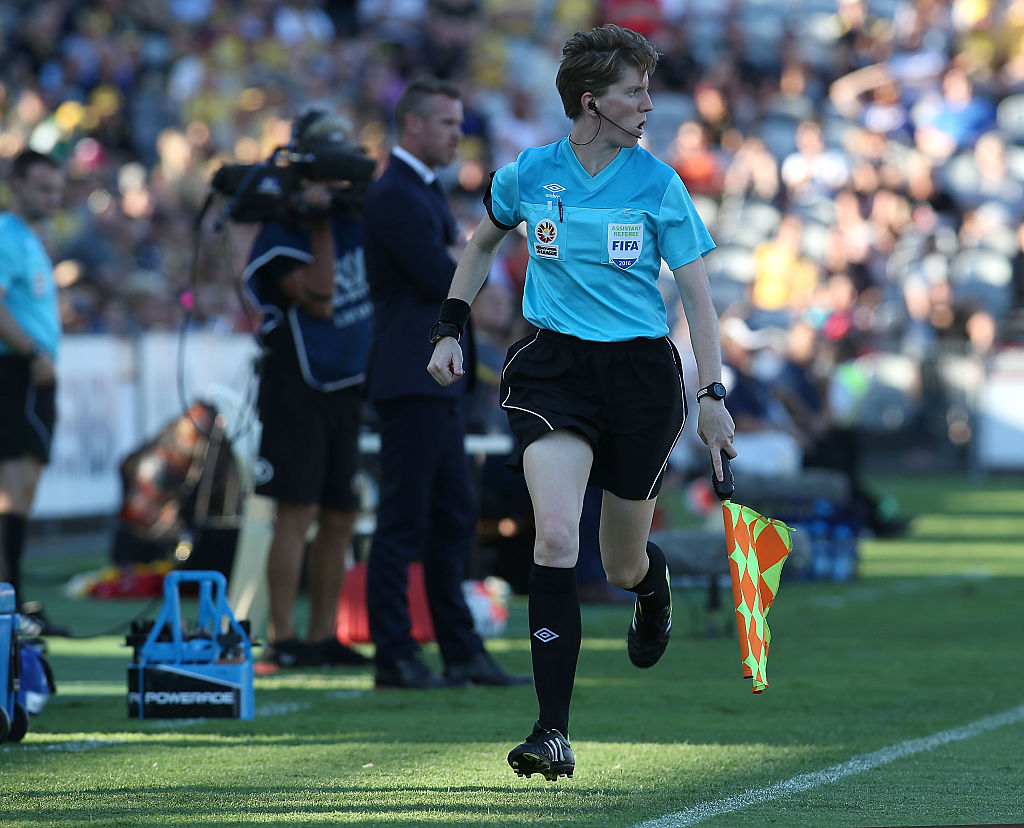 Flynn in action at the A-League match between the Central Coast Mariners and the Newcastle Jets (Photo by Tony Feder/Getty Images)
Flynn in action at the A-League match between the Central Coast Mariners and the Newcastle Jets (Photo by Tony Feder/Getty Images)Is there much variation between the crowds?
I tend these days not to really notice the crowd. You tend to, if it’s a big crowd, -say 20,000, the crowd roars, the crowd goes quiet, but you don’t hear that individual commentary. If it’s a really small crowd, sometimes you do hear that individual person yelling, but it doesn’t really impact me anymore.
Can you remember when that stopped mattering?
I think pretty early, once I got on the international stage, and I started to realise you can’t be distracted by those external influences. It really comes down to your concentration and focus.
In BC Place, for the Canada-Switzerland game, the roar was incredible.
You have to be really careful in matches like that. The referees have a communication system, but if a 50,000 crowd roars then it doesn’t matter, we won’t be heard. So we specifically talked about timing when we spoke, so if we needed to speak after a goal or something like that, we would let the crowd roar and wait for the silence, then speak.
Double headers were a feature of the W-League / A-League this season, how did you find them?
That’s a good question, because I did double headers both ways. I did some matches where I was on the W-League, and I did some where I was on the A-League after the W-League. I got to experience it in both senses. I think it would be fair to say from a facilities perspective that there’s possibly a bit of work that needs to be done at some of the stadiums to account for the number of match officials with two games. I think it worked well for the W-League in terms of promotion and joint promotion -trying to get more people to the grounds. From an A-League perspective I don’t think it had any negative impacts.
This season of football in Australia was not without controversy. What’s your process for reviewing, processing each season from your side of it?
We have quite a strong review process. For an A-League match and also for W-League, there’s a match day assessor at the match who will watch and make notes on our performance. Our matches will also be reviewed by our national coach and a report written. On a night in the week key incidents from each match played will then be sent to us, we review them and have a teleconference about them. On a Friday, all the incidents are put onto an online app along with an expected outcome from the FFA, and we watch those through.
In the A-League there’s also someone at home who watches a match on TV for that perspective. Sometimes what the viewer sees versus what the match day assessor sees can be different.
Week to week, there’s reviews. Before the finals series, for the A-League there’s also a conference in preparation. We did a lot more work this year on styles of play, and teams. So match preparation work became a lot more important in both the leagues this year.
How does technology interact with/threaten the role of match officials?
I think there’ll always be a role for having someone to manage the event or the players. I’m interested to see what happens with technology in football, especially with FIFA starting to look at video technology, and how that will impact the game. I think, also if you look at other sports, technology hasn’t always been the answer either. There’s always be people officiating, there will always be human error, and I think the best way to incorporate technology into that is the challenge for sports administrators all around the world.
Do you have referee role models?
Definitely when I was coming up, developing as a referee, Tammy Ogston the Australian who refereed the final at the Women’s World Cup in 2007. And Sarah Ho, who is now a good friend, she paved the way for women’s refereeing in men’s football. She was the first woman on the A-League. To watch someone travel that path, and then realise that that can open pathways for you was really important.
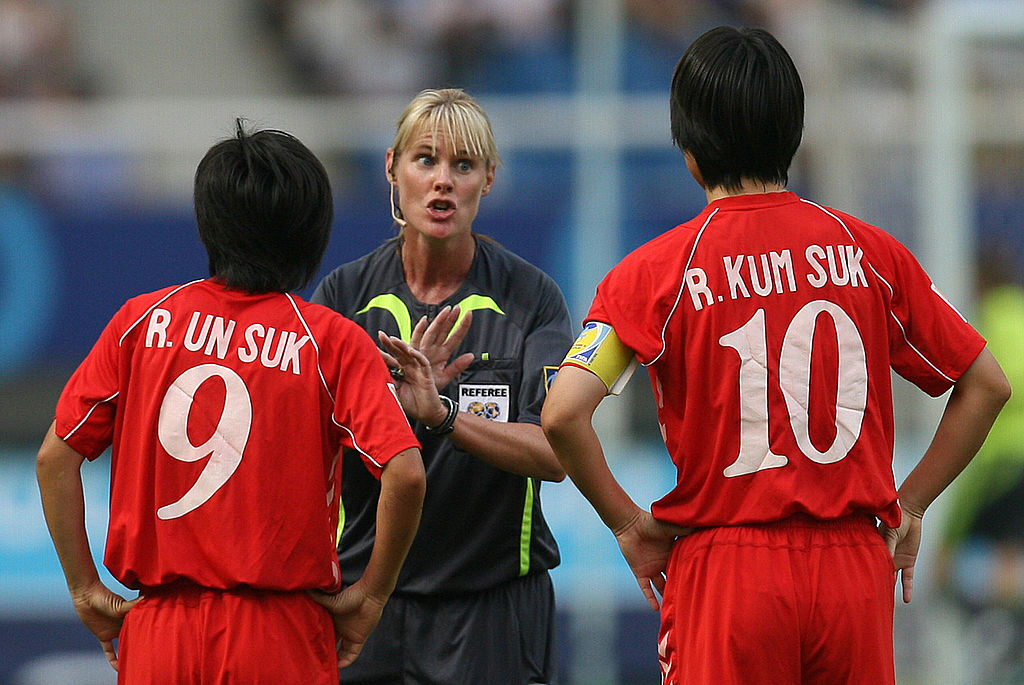 Tammy Ogston is the only Australian to referee a FIFA World Cup final (Photo: Getty Images)
Tammy Ogston is the only Australian to referee a FIFA World Cup final (Photo: Getty Images)Do you watch sport at all without noticing the officials?
No. I always watch the officials. You can learn really good things from it, often with rugby union you can listen to what the referees are saying to the players when you go to the match live. I did that pretty early in my career, and it’s really interesting watching how other match officials interact and communicate with players.
How long since you’ve played sport?
I stopped soccer in my last year of uni, so 2003. When I came to Canberra, I played softball for a little while, just to meet people. But, when I got on the international list, I stopped because I didn’t want to get injured.
Do you miss the competition? Are there light options, like ping pong you could pursue?
(laughter) I just don’t have any time. Between my full time job, and training for refereeing, I’m also doing some research. I struggle to find time to see my friends, let alone to take on another sport.
I think there’s competition within the refereeing. We’re ranked on our performance, just like players referees want to get the finals matches, and that’s based on your performance in the season. We have a good system for selecting refs, if you don’t perform in a season you have to go through a competitive process to get back on the panel for the next one.
As the depth grows, especially in women’s football, it’s getting much more competitive to get on.
Zika, the heat, the travel; Rio is shaping up to be a really interesting one and we wish you all the best.
I think, for me, I’ll prepare for it like I prepared for the World Cup. Obviously I’m conscious of some of the medical issues, and I’ll meet with people to discuss that. You can’t control a lot of that, so you just need to be prepared and manage it. I’ll be as ready as I can.
Related Articles
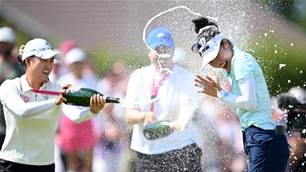
Column: Back-to-Back and Better Than Ever

The Aussies at the U.S Women’s Open
